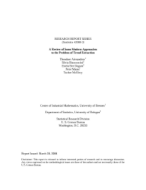
An official website of the United States government
Here’s how you know
Official websites use .gov
A .gov website belongs to an official government organization in the United States.
Secure .gov websites use HTTPS
A lock (
) or https:// means you’ve safely connected to the .gov website. Share sensitive information only on official, secure websites.
-
//
- Census.gov /
- Library /
- Census Working Papers /
- A Review of Some Modern Approaches to the Problem of Trend Extraction
A Review of Some Modern Approaches to the Problem of Trend Extraction
A Review of Some Modern Approaches to the Problem of Trend Extraction
Abstract
Trend extraction is one of the major tasks of time series analysis. The trend of a time series is considered as a smooth additive component that contains information about global change. This paper presents a review of some modern approaches to trend extraction for one-dimensional time series. We do not aim to review all the novel approaches, but rather to observe the problem from different viewpoints and from different areas of expertise. The paper contributes to understanding the concept of a trend and the problem of its extraction. We present an overview of advantages and disadvantages of the approaches under consideration, which are: the Model-Based Approach, nonparametric linear filtering, Singular Spectrum Analysis, and wavelets. The Model-Based Approach assumes the specification of a stochastic time series model for the trend, which is usually either an ARIMA model or a state space model. The nonparametric filtering methods (i.e., the Henderson, LOESS, and Hodrick-Prescott filters) do not require specification of a model; they are quite easy to apply and are used in all applied areas of time series analysis. For these well-known methods we show how their properties can be improved by exploiting Reproducing Kernel Hilbert Space methodology. In addition to these extremely popular approaches, we consider Singular Spectrum Analysis (SSA) and wavelet-based methods. Singular Spectrum Analysis is widespread in the geosciences; its algorithm is similar to that of Principal Components Analysis, but SSA is applied to time series. Wavelet-based methods are currently a de facto standard for denoising in many fields. We summarize how the powerful wavelets approach can be used for trend extraction.
Others in Series
Working Paper
Working Paper
Working Paper
Share
Related Information
Some content on this site is available in several different electronic formats. Some of the files may require a plug-in or additional software to view.
 Yes
Yes
 No
NoComments or suggestions?


Top

